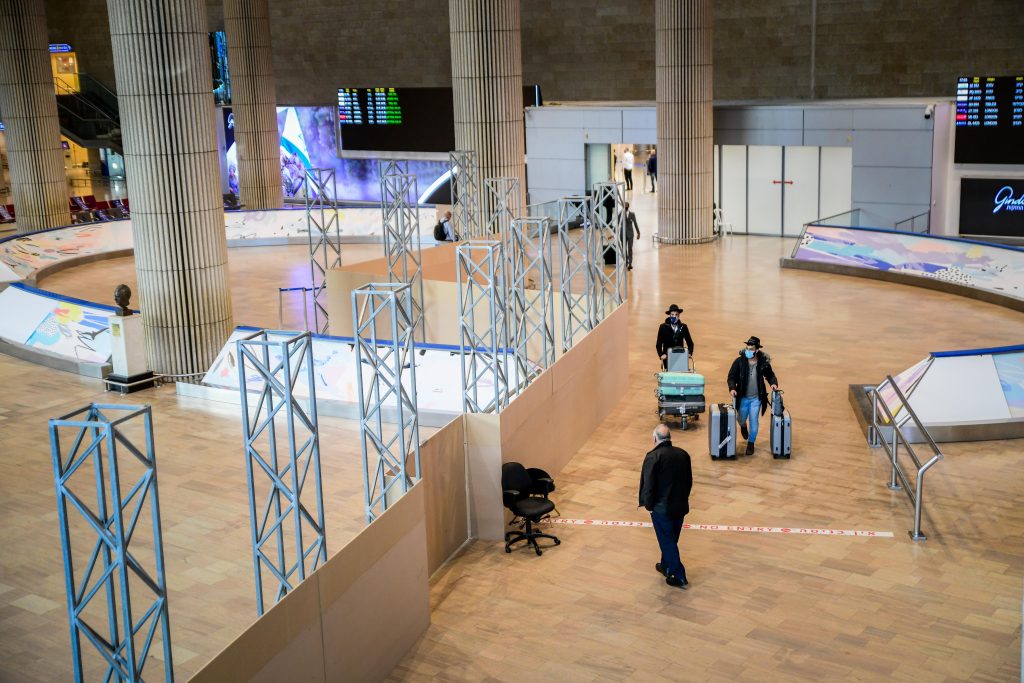Welcome to Israel?

Those words (minus the question mark) were once music to the ears of millions of travelers as their plane touched down in Lod Airport (remember that?), subsequently renamed Ben Gurion Airport in 1973. Travelers, many of them arriving in Israel for their first time, were known to burst into tears and kiss the ground as they stepped off the plane with the realization of their dreams to tread on the land of their ancestors.
During times of peril, when the winds of war were blowing or bombs were exploding on buses, Jews of the Diaspora made a show of solidarity with their country by coming with an entourage of devoted supporters. Certainly, the young bachurim learning in yeshivos and seminary girls in their respective institutions who came in a steady flow, along with fathers, mothers and other family members who came to visit them, were appreciated for their presence as well as the economic boost they gave the Israeli economy. Summers, Sukkos and Pesach saw the modern streets of the cities, as well as places filled with ancient history, crammed with regular visitors and periodic tourists as they imbibed the spirit of the Holy Land.
COVID put an end to much of those visits. As the country and airport locked down, so did the influx of outsiders, who were no longer able to enter the country for many months. With a worldwide pandemic raging, not many people wanted to come. But with time, with the virus subsiding, the desire of Jews worldwide to return to Eretz Yisrael was reawakened. Students poured in and sounds of Torah study resonated once again in the streets of Yerushalayim and elsewhere.
Despite the partial opening, many who wish to come find the door obstructed by an abundance of restrictions, red tape and the lack of personnel to handle the swarm of Jews of the diaspora flocking to Israel.
Only a foreigner who is a first- degree relative of a person living in Israel may enter. For some, proving this relationship may be easy enough; birth certificates showing that Reuven Friedman is the son of Yaakov Friedman might not be too hard to find. But what about proving that Dinah Simon is the daughter of the same Yaakov Friedman? Perhaps that is a bit more complicated, especially with the decades intervening between her birth and her marriage to Mr. or Rabbi Simon.
Dr. Michael Segal, a neurologist and neuroscientist at Harvard Medical School, wrote of his personal dilemma in a Times of Israel blog, “One of the more complex requirements is the need to prove that one has a first-degree relative in Israel. This is not so difficult with male relatives, but for women, there are often name changes with marriage. My 92-year-old mother tells me that she does want me to visit, but she can’t locate the documentation of the name change when she remarried decades ago, after my father died. And worse, her name on my birth certificate is her maiden name, so we have a whole chain of name changes to document.”
Then there is the great runaround to procure the coveted “travel permit.” The manner in which to obtain one is one of the mysteries of the universe. Contacting the consulate will probably not be helpful, with phone calls going unanswered by the overburdened staff. Emails are answered, but often with the lag time of a week or two. If you somehow pass those hurdles, you had better book your ticket quickly, since the permit expires in a mere two weeks. Just imagine a mother trying to plan a visit to her daughter who has given birth and needs her assistance. As Dr. Segal bemoans, “The timing of your visit cannot be known until shortly before the trip.”
Finally, the requirement that the traveler have health insurance which covers any eventual bout with COVID while abroad is a hurdle that quashes the hopes of many would-be visitors. Again, Michael Segal writes, “For those who got one of the mRNA vaccines, and shows a strong antibody response, the probability of such a severe illness is so far below 1% as to be negligible, even if one were to be exposed to the virus. And of course, Israel is one of the places in the world where one is least likely to be exposed.”
An arriving visitor to Israel, after navigating the obstacle course in preparation for the visit, may not quite feel so welcome. Despite being vaccinated, a personal application must be made to the Ministry of Health to be admitted to the Green Pass system which will allow the visitor some degree of freedom of movement. “It is unclear how long that takes,” writes Dr. Segal.
After enumerating many of the same complaints that have been made by Hamodia, Dr. Segal recommends that the Israeli government should implement the following policy changes:
Offer a one-hour antibody test at the airport upon arrival, or better yet, before departure for Israel, with automatic inclusion in the Green Pass system, so you can get right on the train to Tel Aviv or Yerushalayim.
Cancel the insurance requirement for those with a positive antibody test.
Cancel the requirement for proving that an Israeli is a first-degree relative, or instead, allow an attestation by travelers and the relative together with a copy of the relative’s Teudat Zehut (identity card).
Those suggestions for welcoming visitors to Israel will make Israel a more welcoming place.
To Read The Full Story
Are you already a subscriber?
Click "Sign In" to log in!

Become a Web Subscriber
Click “Subscribe” below to begin the process of becoming a new subscriber.

Become a Print + Web Subscriber
Click “Subscribe” below to begin the process of becoming a new subscriber.

Renew Print + Web Subscription
Click “Renew Subscription” below to begin the process of renewing your subscription.



